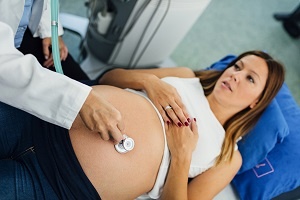HELLP may not be a well-known condition but it’s good to know about it when you’re pregnant. Here we describe what it is, its symptoms and why it matters.
What is HELLP syndrome?
HELLP stands for haemolysis (H), elevated liver enzymes (EL) and low platelet count (LP) (NHS Choices, 2018a). It’s a serious but rare pregnancy complication. It involves red blood cells in the blood breaking down, signs of liver damage and a low platelet count (Haram et al, 2009).
About 0.5% to 0.9% of pregnant women develop HELLP, with most developing it before they have their babies. Most women get it between 27 and 37 weeks of pregnancy; the rest get it within 48 hours of giving birth (Haram et al, 2009).
HELLP syndrome is more common if you have severe pre-eclampsia. There’s still debate about whether HELLP syndrome is a severe form of pre-eclampsia or a totally separate disease (Payne, 2016).
If HELLP syndrome is not treated early it can lead to serious complications. It can even be life-threatening (Action on Pre-Eclampsia, 2018).
Watch the video below, Leigh talks about her experience with HELLP Syndrome, a rare liver and blood clotting disorder.
Symptoms of HELLP syndrome
Most women with HELLP syndrome have the key signs of high blood pressure and high levels of protein in their wee (NHS Choices 2018b; Redman and Sargent, 2005). The symptoms of women with HELLP syndrome are often not very specific, with lots of women reporting:
- fatigue
- pain just below the ribs
- nausea
- vomiting
- flu-like symptoms.
(Payne, 2016)
Some women have headaches, and others report changes in their vision or excessive weight gain and swelling (Haram et al, 2009). The symptoms often get worse at night (Payne, 2016).
"You can get HELLP syndrome without any of those symptoms and because of that, HELLP syndrome can be difficult to diagnose."
HELLP syndrome can often be misdiagnosed for other conditions like gastritis, flu, acute hepatitis and gall bladder disease(Sibai, 2004).
HELLP syndrome treatment and prognosis
If it’s safe, induction is the best way to treat HELLP syndrome – it means you’d have your baby immediately. That will usually happen from around 34 weeks. If you’re 24 to 34 weeks pregnant and get HELLP syndrome, you’ll be given corticosteroids to help your baby’s lungs mature before you’re induced (Mihu et al, 2007). About 60% of women with HELLP have a caesarian section (Mihu et al, 2007).
Treatment will be similar to that of severe pre-eclampsia (Mihu et al, 2007). In severe cases, you’ll be in an intensive care unit with dialysis and ventilatory support. Many women with HELLP syndrome will need a blood transfusion. After you have your baby, you’ll be monitored closely but should soon recover.
Most women with HELLP syndrome can be treated if it’s caught in time but in rare cases, mums can die from liver rupture or a stroke (Pre-eclampsia Foundation, 2018). If you notice any of the symptoms of HELLP syndrome contact your midwife or GP for advice immediately, or call NHS 111.
If you’re diagnosed with HELLP after your baby is born, you may be treated with plasma exchange.
Who is more likely to get HELLP syndrome when they are pregnant?
You might be more likely to get HELLP syndrome if you:
- have a history of high blood pressure during pregnancy
- are pregnant with your first baby
- are over 35 years of age
- are expecting twins, triplets or more.
Will HELLP syndrome affect my baby?
Inducing labour is the only treatment for HELLP syndrome, so the outcome for your baby mainly depends on when you’re diagnosed. Premature babies are those born before 37 weeks. They may not be fully developed, which can lead to complications.
If your baby is born prematurely, they may need to be monitored and have a stay in the neonatal intensive care unit (NHS Choices, 2018a). If your baby weighs at least 1kg at birth, they are just as likely as non-HELLP babies of the same size to survive and be healthy (Pre-eclampsia Foundation, 2018). However, the stillbirth rate is higher than for pre-eclampsia and eclampsia. Out of every 1,000 pregnancies in women with HELLP, 51 babies are stillborn (Pre-eclampsia Foundation, 2018).
HELLP syndrome in future pregnancies
If you’ve had HELLP syndrome in the past that unfortunately means you’re at increased risk of all forms of pre-eclampsia if you get pregnant again. About 16% to 52% of women who had HELLP in one pregnancy will get it in a future pregnancy (Sullivan et al, 1994; Pre-eclampsia Foundation, 2018).
This page was last reviewed in March 2018
Further information
Our support line offers practical and emotional support with feeding your baby and general enquiries for parents, members and volunteers: 0300 330 0700.
We also offer antenatal courses which are a great way to find out more about birth, labour and life with a new baby.
Make friends with other parents-to-be and new parents in your local area for support and friendship by seeing what NCT activities are happening nearby.
Get support and talk to other women who have been affected by HELLP syndrome through the Pre-eclampsia Foundation.
Haram K, Svendsen E, Abildgaard U. (2009) The HELLP syndrome: clinical issues and management. A Review. BMC Pregnancy Childbirth. 26(9):8. doi: 10.1186/1471-2393-9-8. Available from: https://www.ncbi.nlm.nih.gov/pubmed/PMC2654858 [Accessed 1st March 2018].
Mihu D, Costin N, Mihu CM, Seicean A, Ciortea R. (2007) HELLP syndrome – a multisystemic disorder. Journal of Gastrointestinal and Liver Diseases, 16(4):419. Available from: https://www.ncbi.nlm.nih.gov/pubmed/10368474 [Accessed 1st March 2018].
NHS Choices. (2018a) Pre-eclampsia complications. Available from: https://www.nhs.uk/conditions/pre-eclampsia/complications/ [Accessed 1st March 2018].
NHS Choices. (2018b) Pre-eclampsia. Available from: https://www.nhs.uk/conditions/pre-eclampsia/ [Accessed 1st March 2018].
Payne. (2016) HELLP syndrome. Available from: https://patient.info/doctor/hellp-syndrome-pro [Accessed 1st March 2018].
Pre-eclampsia Foundation. (2018) HELLP syndrome. Available from: https://www.preeclampsia.org/health-information/53-health-information/57-hellp-syndrome [Accessed 1st March 2018].
Redman CW, Sargent IL. (2005) Latest advances in understanding preeclampsia. Science, 308:1592-1594. [Accessed 1st March 2018].
Sibai BM. (2004) Diagnosis, controversies, and management of the syndrome of hemolysis, elevated liver enzymes and low platelet count. Obstetrics & Gynecology, 103:981-991. [Accessed 1st March 2018].
Sullivan CA, Magann EF, Perry Jr KG, Roberts WE, Blake PG, Martin Jr JN. (1994). The recurrence risk of the syndrome of hemolysis, elevated liver enzymes and low platelets (HELLP) in subsequent gestations. American journal of obstetrics and gynecology, 171:940-943. [Accessed 1st March 2018].
Further reading
Fitzpatrick KE, Hinshaw K, Kurinczuk JJ, Knight M. (2014) Risk factors, management and outcomes of hemolysis, elevated liver enzymes, and low platelets syndrome and elevated liver enzymes, low platelets syndrome. Obstet Gynecol.123(3):618-27. doi: 10.1097/AOG.0000000000000140. Available from: https://www.ncbi.nlm.nih.gov/pubmed/24499757 [Accessed 1st March 2018].
Martin JN Jr, Rinehart BK, May WL, Magann EF, Terrone DA, Blake PG. (1999) The spectrum of severe preeclampsia: comparative analysis by HELLP.





